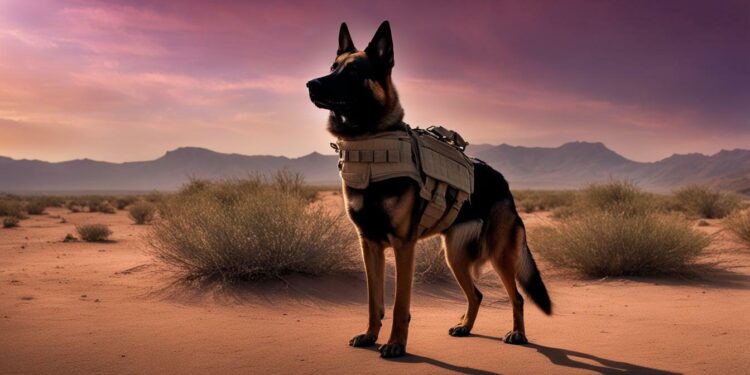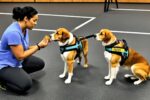Unsung Heroes: The Vital Role of Military Working Dogs in Warfare

Military working dogs, also known as military dogs or K9 units, play a vital role in warfare by providing essential support to our forces and helping to keep our nation safe. These highly trained dogs are capable of detecting explosives and narcotics, searching for missing individuals, and providing security in high-risk situations. Their rigorous training and adherence to high standards make them an invaluable asset in military operations.
Throughout history, military working dogs have been an integral part of warfare. From ancient civilizations to modern-day conflicts, these dogs have proven their worth time and time again. With their keen senses and specialized skills, they have become indispensable in various missions and operations.
The training that military dogs undergo is renowned for its rigor and intensity. They are trained to perform their duties with precision and accuracy, ensuring the safety and success of our forces. Their handlers work tirelessly to develop the dogs’ skills and maintain their high standards.
Military working dogs possess a range of skills and specializations that contribute to their effectiveness. They have the ability to detect explosives and narcotics, keeping our forces safe from hidden threats. They can also search for missing individuals, providing invaluable assistance in rescue operations. Additionally, these dogs provide security by alerting their handlers to potential dangers, ensuring the safety of our troops.
One of the remarkable traits of military working dogs is their loyalty and intelligence. Their unwavering loyalty to their handlers and their commitment to their duties make them trusted companions on the battlefield. Their intelligence allows them to quickly learn and adapt, making them highly effective in carrying out their tasks.
The impact of military working dogs on the battlefield cannot be overstated. Their presence can change the outcome of operations, providing critical support to our forces. Their unique abilities and specialized training give them an edge in detecting threats and ensuring the safety of our troops.
However, military working dogs also face challenges in their line of duty. They encounter danger and risk their lives to protect our forces. They experience separation from their handlers, often enduring loneliness while serving far away from home. Despite these challenges, they serve with unwavering bravery and dedication, exemplifying the true spirit of a hero.
It is crucial to recognize the contributions of military working dogs and honor their service. These unsung heroes deserve our respect and appreciation for their bravery and sacrifice. By acknowledging their vital role in warfare, we can ensure that their legacy endures and their service is never forgotten.
In the next section, we will explore the rich history of military dogs in warfare, shedding light on their enduring presence throughout the centuries. Stay tuned to uncover the fascinating journey of these remarkable animals.
A Rich History: Military Dogs in Warfare
The use of military working dogs dates back centuries, with these incredible animals playing a significant role in conflicts around the world. From ancient civilizations to modern-day warfare, military dogs have proven to be invaluable assets on the battlefield.
Throughout history, different breeds have been utilized for their unique abilities and traits. For example, German Shepherds are known for their intelligence and loyalty, making them excellent at tasks such as search and rescue, as well as detecting explosives.
During World War I, military dogs were used for a variety of purposes, including delivering messages, detecting enemy soldiers and mines, and providing companionship to troops. Their keen senses and unwavering loyalty helped save countless lives.
Ancient Military Dog Breeds
| Breed | Origin |
|---|---|
| Molossus | Ancient Greece |
| Alaunt | Medieval Europe |
| Sloughi | North Africa |
| Tibetan Mastiff | Tibet |
Today, military dog breeds are carefully selected and trained to meet the specific needs of the armed forces. The bond between military working dogs and their handlers is incredibly strong, as they rely on each other for protection and support.
As technology continues to advance, military dog training techniques are also evolving. These highly intelligent animals are taught to perform complex tasks, such as identifying improvised explosive devices (IEDs) and apprehending suspects. Their exceptional skills and dedication make them an integral part of modern warfare.
In conclusion, the rich history of military dogs in warfare cannot be overstated. These brave and loyal animals have served alongside soldiers for centuries, saving lives and providing essential support. From ancient civilizations to present-day conflicts, military working dogs continue to make a significant impact on the battlefield.
Rigorous Training and High Standards
Military working dogs undergo extensive training to develop the skills and discipline necessary for their critical roles in warfare. Their training is rigorous, ensuring that they are well-prepared for the challenges they will face on the battlefield. From an early age, these dogs are trained to obey commands, follow instructions, and react calmly in high-pressure situations.
One of the key aspects of their training is scent detection. Military dogs are trained to detect explosives and narcotics, making them invaluable assets in detecting and preventing potential threats. Through a combination of positive reinforcement and repetition, they learn to identify specific scents and alert their handlers. This skill is essential in ensuring the safety and security of military personnel and the general public.
| Skills of Military Working Dogs | Specializations |
|---|---|
| Bomb detection | Explosives detection |
| Drug detection | Narcotics detection |
| Tracking | Search and rescue |
| Patrol and security | Area protection |
Military working dogs also undergo physical fitness training to ensure they are in optimal condition for their demanding roles. They are trained to be agile, strong, and capable of navigating various terrains. This physical training is complemented by mental stimulation, as these dogs need to be able to think quickly and make decisions in complex situations.
The high standards to which these dogs are held are a testament to their importance in warfare. They are expected to perform flawlessly and remain focused even in the midst of chaos. Their loyalty, intelligence, and dedication make them indispensable assets on the battlefield. Despite the challenges they face and the risks they take, military dogs continue to serve with unwavering commitment, deserving recognition as true heroes.
Skills and Specializations of Military Working Dogs
Military working dogs possess a range of skills and specializations that make them indispensable assets in warfare. One of their most remarkable abilities is their keen sense of smell, which allows them to detect explosives and narcotics with incredible accuracy. These highly trained dogs are capable of searching large areas quickly, ensuring the safety of military personnel and civilians alike. Their expertise in detecting these potentially deadly substances not only prevents harm but also helps gather crucial intelligence.
In addition to their skills in explosive and narcotic detection, military working dogs are also trained to assist in search and rescue operations. Their keen noses and agility enable them to track and locate missing individuals, even in challenging terrain or adverse conditions. These dogs can cover large areas efficiently, increasing the chances of a successful rescue mission. Their dedication and determination in searching for and locating people in need have saved countless lives.
Military working dogs are not only adept at detection and search and rescue operations but also provide essential security. These loyal and protective animals are trained to apprehend suspects, defend their handlers, and patrol high-risk areas. Their presence alone can act as a powerful deterrent, preventing potential threats and ensuring the safety of military installations and personnel. With their agility, strength, and heightened senses, these dogs are invaluable in maintaining security and safeguarding against potential dangers.
| Skills and Specializations | Examples |
|---|---|
| Explosive Detection | Detecting bombs, landmines, and explosive devices |
| Narcotic Detection | Identifying drugs and narcotics, including hidden caches |
| Search and Rescue | Tracking and locating missing individuals in various environments |
| Security | Apprehending suspects, defending handlers, and patrolling |
The skills and specializations of military working dogs are a testament to their intelligence, loyalty, and adaptability. These remarkable animals provide invaluable support to their human counterparts, enhancing the effectiveness of military operations and ultimately helping to ensure the safety and security of our nation.
The Loyalty and Intelligence of Military Dogs
The loyalty and intelligence exhibited by military working dogs are key factors that make them exceptional assets on the battlefield. These remarkable animals are trained to perform a wide range of tasks that contribute to the success of military operations. They possess an unwavering loyalty to their handlers and a deep understanding of their roles and responsibilities. Whether it’s detecting explosives, searching for missing individuals, or providing security, military dogs consistently demonstrate their dedication and effectiveness.
One of the unique qualities of military working dogs is their exceptional sense of smell. They have been bred for generations to possess an olfactory capability that far surpasses that of humans. This remarkable skill allows them to detect even the faintest scent of explosives or narcotics, often leading to crucial discoveries and ensuring the safety of our armed forces. Their intelligence and ability to comprehend and follow commands make them valuable partners in the field, where split-second decisions can mean the difference between life and death.
In addition to their physical capabilities, military working dogs also develop a strong bond with their handlers. This relationship is built on trust, mutual respect, and a shared mission to protect and serve. The close partnership between handlers and their dogs enhances their effectiveness on the battlefield, as they develop an intuitive understanding of each other’s cues and intentions. This bond extends beyond duty, with many handlers considering their canine counterparts as part of their family.
| Skill | Description |
|---|---|
| Explosives Detection | Military dogs are trained to detect various types of explosives, including hidden landmines and improvised explosive devices (IEDs). Their reliable detection skills save lives and assist in dismantling potential threats. |
| Search and Rescue | In times of disaster or conflict, military dogs play a crucial role in locating and rescuing missing individuals. Their agility, endurance, and sharp senses enable them to navigate challenging terrains and detect signs of life. |
| Security and Patrol | Military working dogs are trained to provide security by patrolling sensitive areas and detecting any unauthorized individuals. Their presence alone acts as a deterrent, effectively safeguarding military installations. |
The loyalty, intelligence, and exceptional skills of military working dogs contribute significantly to the safety and success of our armed forces. These unsung heroes deserve recognition and appreciation for their unwavering dedication and the sacrifices they make. It is essential that we continue to support and honor these remarkable animals who selflessly serve our nation, both on and off the battlefield.
Impact on the Battlefield
Military working dogs have a profound impact on the battlefield, providing invaluable support to our forces and contributing to mission success. These highly trained canines possess a wide range of skills and specializations that enable them to perform critical tasks in combat zones.
One of their primary roles is explosive and narcotics detection. With their acute sense of smell, military dogs are able to locate hidden explosives and drugs, ensuring the safety of our troops and preventing potential threats. Their ability to search for missing individuals is also crucial, as they can cover large areas quickly, increasing the chances of locating personnel in need of assistance.
Furthermore, military dogs provide a vital security function by protecting military installations and personnel. Their presence alone acts as a deterrent to potential adversaries, and their keen senses and training allow them to alert their handlers to any approaching threats. In high-pressure situations, their loyalty and obedience are essential, providing a calming and reassuring presence to their human counterparts.
| Skills and Specializations of Military Working Dogs |
|---|
| Explosive and narcotics detection |
| Search and rescue operations |
| Security and threat detection |
Despite the invaluable contributions of military working dogs, they face numerous challenges on the battlefield. These brave canines often work in hazardous environments, exposing themselves to danger alongside their human counterparts. Additionally, they can experience loneliness when separated from their handlers, creating emotional challenges for both the dog and the handler.
Nevertheless, military working dogs continue to serve with unwavering dedication, displaying their bravery and commitment to protecting our nation. It is crucial that we recognize and honor these unsung heroes for their sacrifices and the indispensable role they play in warfare.
Challenges Faced by Military Dogs
Despite their exceptional abilities, military working dogs face unique challenges, including the inherent dangers of warfare and the emotional strain of being away from their handlers. These brave canines are often deployed to hostile environments where they encounter explosives, gunfire, and other life-threatening situations. In their role as sentries and scouts, military dogs are at the forefront of the action, exposing themselves to significant risk in order to protect and serve.
In addition to physical dangers, military dogs also experience emotional strain when separated from their handlers. The bond between a dog and their handler is strong, built on trust, loyalty, and countless hours of training together. When deployed, these dogs are temporarily separated from their handlers, which can lead to feelings of loneliness and anxiety. Despite these challenges, military dogs remain focused and dedicated to their mission, relying on their training and instinct to carry out their duties.
To mitigate the challenges faced by military dogs, handlers receive specialized training in caring for their canine partners. These handlers are responsible for the well-being of the dogs, ensuring they receive the necessary medical attention, proper nutrition, and adequate rest. Handlers also provide emotional support to their dogs, helping to alleviate any stress or anxiety they may experience during their deployment. The bond between handler and dog is crucial, as it strengthens the overall effectiveness and performance of the K9 unit.
The Emotional Toll
Separation from their handlers can take an emotional toll on military dogs. These highly intelligent animals form deep bonds with their handlers, relying on them for guidance and reassurance. Being away from their handlers for extended periods of time can result in feelings of sadness and confusion. In recognition of this, efforts are made to maintain continuity whenever possible, allowing the dogs and handlers to reunite and continue their work together.
| Challenges Faced by Military Dogs | Impact on Dogs | Mitigation Efforts |
|---|---|---|
| Dangerous environments | Physical injuries and trauma | Specialized training and protective gear |
| Separation from handlers | Emotional strain and anxiety | Continuity efforts and emotional support |
| Loneliness and stress | Decreased morale and performance | Handler companionship and care |
Despite the challenges they face, military working dogs continue to demonstrate resilience, bravery, and unwavering dedication to their handlers and the mission at hand. Their contributions to warfare should not go unnoticed, and efforts should be made to support and recognize these incredible animals for their service. Through proper training, care, and appreciation, we can ensure that military dogs are given the respect and admiration they deserve.
The Bravery and Dedication of Military Dogs
Military working dogs embody bravery and dedication, selflessly putting themselves in harm’s way to protect our forces and defend our nation. These remarkable canines undergo rigorous training and are held to the highest standards, ensuring they are prepared for the challenges they will face in the line of duty. With their unwavering loyalty and intelligence, military dogs make a significant impact on the battlefield.
One of the key skills of military working dogs is their ability to detect explosives and narcotics. Through intensive training, they develop a keen sense of smell that enables them to locate hidden threats, potentially saving countless lives. These dogs also excel in search and rescue operations, using their heightened senses to find missing individuals in various terrains and conditions. Their specialized training allows them to navigate through difficult environments, providing critical assistance in locating personnel in need.
Military working dogs play a vital role in providing security. Whether it’s patrolling a base, conducting perimeter checks, or accompanying tactical units during missions, these dogs are a powerful deterrent against potential threats. Their presence alone can deter adversaries and add an extra layer of protection for our service members. Military dogs are trained to be highly obedient, allowing them to respond quickly to commands and protect their handlers in dangerous situations.
| Skill | Specialization |
|---|---|
| Explosives and narcotics detection | Protecting against hidden threats |
| Search and rescue | Locating missing individuals in various terrains |
| Security | Deterrence and protection of personnel and facilities |
“Military working dogs embody bravery and dedication, selflessly putting themselves in harm’s way to protect our forces and defend our nation.”
These incredible animals, however, face numerous challenges. They are often deployed to hostile environments where they encounter danger daily. From enemy fire to extreme weather conditions, military dogs willingly put themselves at risk to serve alongside their human counterparts. Additionally, these dogs experience separation from their handlers, leading to feelings of loneliness and anxiety. Despite these challenges, military working dogs remain dedicated to their mission, demonstrating unfaltering loyalty and bravery.
The bravery and dedication displayed by military working dogs should not go unnoticed. Their contributions to our nation’s security and the well-being of our forces are immeasurable. It is crucial that we recognize and honor these unsung heroes for their selfless service and unwavering commitment.
Recognition for Military Dogs
It is crucial to give military working dogs the recognition they deserve for their invaluable service and unwavering loyalty. These remarkable canines play an integral role in warfare, using their highly trained skills to protect our nation and save lives. Their contributions often go unnoticed, but they are truly unsung heroes.
Military dogs undergo rigorous training and are held to incredibly high standards. They are trained to detect explosives and narcotics, search for missing individuals, and provide security in challenging and dangerous environments. Their loyalty and intelligence make them highly effective in their roles. These working dogs have been an essential part of warfare for centuries, and their impact on the battlefield is undeniable.
However, military dogs face numerous challenges. They encounter danger and risk their lives in the line of duty. They also experience loneliness when separated from their handlers. Despite these challenges, these extraordinary dogs continue to serve with unwavering dedication and bravery.
It is our responsibility to honor and appreciate the service of military working dogs. By recognizing their contributions and acknowledging their bravery, we can show our gratitude for their selfless sacrifice. They deserve our support and admiration for the invaluable role they play in protecting our nation and ensuring our safety.
| Skills of Military Working Dogs | Specializations |
|---|---|
| Detect explosives and narcotics | Explosive detection dogs, Narcotics detection dogs |
| Search for missing individuals | Search and rescue dogs |
| Provide security | Patrol dogs, Guard dogs |
The Bond Between Handlers and Dogs
The bond between military working dogs and their handlers is a powerful and vital component of their success on the battlefield. These highly trained dogs depend on their handlers for guidance, support, and companionship, forming an unbreakable partnership based on trust and loyalty.
Handlers spend countless hours with their canine counterparts, training and developing a deep understanding of each other’s strengths, weaknesses, and communication cues. This level of rapport allows them to work seamlessly together, effectively carrying out missions and ensuring the safety of their teams.
It is through this bond that handlers are able to harness the incredible skills and instincts of the military working dogs. Whether it’s searching for explosives, tracking down enemy combatants, or providing security, these remarkable animals rely on their handlers for guidance and direction in high-stress situations.
| Benefits of the Handler-Dog Bond: |
|---|
| Enhanced Communication |
| Increased Efficiency and Effectiveness |
| Mutual Trust and Reliability |
| Improved Morale and Teamwork |
“The bond between a military dog handler and their dog is something that cannot be easily described—it is a connection that goes beyond words. It’s a partnership built on trust, respect, and an unwavering dedication to the mission.” – Sergeant John Anderson, Military Dog Handler
Handlers often develop a deep emotional connection with their working dogs, considering them not just as partners, but as members of their family. This bond extends beyond the battlefield, as handlers are responsible for the care and well-being of their canine companions, ensuring they are provided with the love, support, and medical attention they need.
The bond between handlers and military working dogs is a testament to the incredible loyalty, dedication, and resilience of these remarkable animals. As unsung heroes, they serve alongside their handlers, selflessly putting their lives on the line to protect our nation. It is important to recognize and honor the invaluable contributions of both the handlers and their canine counterparts in defending our freedom.
The Impact of Military Dogs in Civilian Life
The skills and training acquired by military working dogs extend beyond their service in warfare, with many of them continuing to make a difference in civilian life. These highly trained and disciplined canines play a crucial role in various areas, including law enforcement, search and rescue operations, and providing support to veterans.
In law enforcement, military working dogs bring their expertise in detecting explosives, narcotics, and other illicit substances to help keep our communities safe. Their keen sense of smell and rigorous training enable them to locate hidden contraband with remarkable accuracy. These four-legged officers work alongside human law enforcement personnel, providing an invaluable asset in combating crime.
Furthermore, military dogs play a significant role in search and rescue operations. Their exceptional tracking abilities and agility make them well-suited for locating missing individuals, whether it’s in urban areas or expansive wilderness. These canine heroes help save lives by swiftly locating and alerting search teams to the presence of individuals in distress.
Table: Civilian Roles of Military Working Dogs
| Field | Role |
|---|---|
| Law Enforcement | Explosive and Narcotic Detection |
| Search and Rescue | Tracking Missing Individuals |
| Support for Veterans | Therapy and Assistance Dogs |
Moreover, military dogs provide vital support to veterans. Many of these canines are trained as therapy dogs, offering emotional support and companionship to veterans who may be struggling with post-traumatic stress disorder (PTSD) or physical disabilities. They provide comfort and assistance to those who have served our country, aiding in their recovery and improving their quality of life.
It is evident that the skills and training imparted to military working dogs go beyond their role in warfare. Their exceptional abilities find purpose in various civilian applications, making them true heroes both on and off the battlefield.
The Future of Military Working Dogs
The future of military working dogs looks promising, with enhanced training methods and continued demand for their unique capabilities. As technology advances, so does the ability to train and equip these exceptional animals, ensuring they remain valuable assets on the battlefield. The military dog training programs have evolved to incorporate cutting-edge techniques that focus on enhancing their skills and abilities in various specialized areas.
One area of advancement is in the utilization of scent detection training. Military working dogs are known for their remarkable sense of smell, which allows them to detect explosives, narcotics, and other dangerous substances. With enhanced training methods, these dogs can now detect even trace amounts of these substances, enabling them to play a crucial role in ensuring the safety and security of military operations.
Another area of development is the continued emphasis on the bond between military working dogs and their handlers. The relationship between a dog and its handler is essential for effective teamwork and communication. Training programs now focus on strengthening this bond through trust-building exercises, fostering an even greater level of cooperation and understanding between the two.
To highlight the advancements and capabilities of military working dogs, here is a table showcasing their various skills and specializations:
| Skills and Specializations | Description |
|---|---|
| Explosives Detection | Military working dogs are trained to detect explosives, ensuring the safety of military personnel and the public. |
| Narcotics Detection | These dogs can identify narcotics, helping to combat drug trafficking and keeping dangerous substances off the streets. |
| Search and Rescue | Trained to locate missing individuals in various environments, military working dogs assist in search and rescue operations. |
| Security and Patrol | These dogs are skilled in providing security for military installations, ensuring the protection of personnel and assets. |
As the demand for military working dogs continues to grow, their presence will not only be felt on the battlefield but also in civilian life. These highly trained dogs are increasingly being utilized in law enforcement agencies and are providing support to veterans as therapy dogs. Their loyalty, intelligence, and unwavering dedication make them valuable assets in various capacities beyond warfare.
Celebrating the Heroes
It is essential to celebrate and honor the heroic military working dogs who selflessly serve our country and protect our forces. These remarkable canines play a vital role in warfare, yet their contributions often go unnoticed. Their loyalty, intelligence, and specialized skills make them indispensable assets on the battlefield.
Military working dogs undergo rigorous training and are held to high standards. They are trained to detect explosives and narcotics, search for missing individuals, and provide security. These dogs have been a part of warfare for centuries, and their history is rich with countless stories of bravery and dedication.
Despite the challenges they face, including the danger they encounter and the loneliness they experience while separated from their handlers, military working dogs continue to serve with unwavering dedication. They deserve recognition and appreciation for their unwavering commitment to protecting our nation.
| Skills and Specializations | Loyalty and Intelligence | Impact on the Battlefield |
|---|---|---|
| Military dogs are trained to detect explosives and narcotics, search for missing individuals, and provide security. | The loyalty and intelligence of military working dogs contribute to their effectiveness in warfare. | The presence of military dogs on the battlefield can make a significant difference in operations. |
These unsung heroes not only serve in warfare but also make an impact in civilian life, assisting in law enforcement and providing support to veterans. They have an enduring legacy and continue to be an integral part of our nation’s security. It is crucial that we recognize and honor the contributions of these brave military working dogs.
Support for Military Working Dogs
There are multiple avenues for individuals to show support and appreciation for military working dogs, ensuring they receive the care and resources they need. These unsung heroes play a vital role in warfare and deserve recognition for their bravery and dedication. Here are some ways you can support these incredible animals:
- Donate to organizations: Many non-profit organizations focus on providing care and resources for military working dogs. By donating to these organizations, you can help ensure these dogs receive proper medical treatment, training, and retirement plans.
- Volunteer your time: If you have a passion for working with animals, consider volunteering with organizations that support military working dogs. This can involve assisting with training programs, helping care for retired dogs, or raising awareness about their importance.
- Spread awareness: Share information about military working dogs on your social media platforms or in your community. By raising awareness about their contributions and needs, you can help garner support and recognition for these invaluable members of the military.
- Adopt a retired military working dog: Once a military working dog is retired, they often need a loving home to spend their well-deserved retirement years. Inquire with organizations that facilitate the adoption process for retired military dogs and provide a safe and loving environment for them.
Supporting military working dogs is not only a way to show appreciation for their service but also a means to ensure their well-being. These dogs have dedicated their lives to protecting our nation, and it is our duty to honor and support them in return. Through donations, volunteering, and spreading awareness, we can make a difference in the lives of these remarkable animals.
| Ways to Support Military Working Dogs | Benefits |
|---|---|
| Donate to organizations | – Ensures medical treatment and retirement plans – Supports training programs |
| Volunteer your time | – Assists with training and care for retired dogs – Raises awareness |
| Spread awareness | – Highlights contributions and needs – Garners support and recognition |
| Adopt a retired military working dog | – Provides a loving home for retirement years – Offers a safe and caring environment |
The Enduring Legacy of Military Working Dogs
The enduring legacy of military working dogs serves as a reminder of their invaluable contributions to warfare and their place in our nation’s history. These highly trained and dedicated canines have played a crucial role in protecting our country, often in ways that go unnoticed by the public eye.
From detecting explosives and narcotics to searching for missing individuals, military working dogs possess a remarkable set of skills that can save lives and enhance the effectiveness of military operations. Their loyalty and intelligence make them trusted companions, while their ability to adapt to challenging environments and high-pressure situations is a testament to their exceptional training.
However, the life of a military working dog is not without its challenges. These brave animals face danger on the battlefield, working tirelessly alongside their handlers to keep our troops safe. They also experience periods of separation and loneliness when deployed, highlighting the bond between handlers and dogs that is essential to their success and well-being.
| Challenges Faced by Military Dogs | Support for Military Working Dogs |
|---|---|
| • Danger on the battlefield | • Donating to organizations that provide care and resources |
| • Loneliness and separation from handlers |
Despite these challenges, military working dogs continue to serve with unwavering dedication, demonstrating a bravery that deserves recognition. These unsung heroes embody the selflessness and commitment that are a fundamental part of military service. It is essential that we celebrate their contributions and support them in any way possible, ensuring they receive the care and appreciation they deserve.
Conclusion
Military working dogs are unsung heroes who play a vital role in warfare, and it is imperative that we recognize and honor their contributions to our nation’s security.
These highly trained dogs are a force to be reckoned with, utilizing their keen sense of smell and exceptional skills to detect explosives and narcotics, search for missing individuals, and provide security on the battlefield. Their rigorous training and adherence to high standards ensure their effectiveness in critical operations.
Historically, military dogs have been an integral part of warfare, proving their worth time and time again. Their loyalty and intelligence make them valuable assets in protecting our troops and achieving military objectives.
However, it is important to acknowledge the challenges that military working dogs face. They often find themselves in dangerous situations and experience loneliness when separated from their handlers. Despite these hardships, these brave canines display unwavering dedication to their missions and deserve our utmost respect.
Military working dogs continue to make a significant impact even after their service in the military. They find new roles in civilian life, assisting law enforcement and providing support to veterans. Their enduring legacy is a testament to their importance throughout history.
In conclusion, the invaluable contributions of military working dogs cannot be overstated. These remarkable animals exemplify bravery, loyalty, and dedication, embodying the true meaning of service. It is our duty to celebrate and support these unsung heroes, ensuring their remarkable efforts are recognized and honored.
FAQ
Q: What role do military working dogs play in warfare?
A: Military working dogs play a vital role in warfare by detecting explosives and narcotics, searching for missing individuals, and providing security.
Q: How are military working dogs trained?
A: Military working dogs undergo rigorous training to develop their skills and abilities. They are trained to perform specific tasks and are held to high standards.
Q: How long have military dogs been used in warfare?
A: Military dogs have been used in warfare for centuries, with a long history of contributing to military operations.
Q: What skills do military working dogs possess?
A: Military working dogs have a range of skills and specializations, including the ability to detect explosives and narcotics, search for missing people, and provide security.
Q: Are military dogs intelligent?
A: Yes, military dogs are known for their intelligence. Their intelligence helps them in performing their tasks effectively and contributes to their loyalty.
Q: How do military dogs impact the battlefield?
A: The presence of military dogs on the battlefield can make a significant difference in operations. Their skills and abilities can enhance safety and security for military personnel.
Q: What challenges do military dogs face?
A: Military dogs face challenges such as encountering danger and experiencing loneliness when separated from their handlers during deployments.
Q: How brave and dedicated are military dogs?
A: Military dogs display unwavering bravery and dedication in their service. They put their lives on the line to protect and serve their handlers and their country.
Q: Why is it important to recognize military working dogs?
A: Recognizing military working dogs is essential to honor their contributions and acknowledge their bravery and service to our nation.
Q: What is the bond between military working dogs and their handlers?
A: A special bond develops between military working dogs and their handlers. This bond is built on trust, loyalty, and mutual reliance, contributing to their effectiveness.
Q: How do military dogs continue to make an impact in civilian life?
A: Military working dogs continue to contribute to society by assisting in law enforcement, providing support to veterans, and fulfilling various roles in civilian life.
Q: What is the future of military working dogs?
A: The future of military working dogs involves advancements in training techniques and the ongoing need for these exceptional animals in warfare to enhance security and safety.
Q: How can individuals support military working dogs?
A: Individuals can support military working dogs by donating to organizations that provide care, resources, and support to these incredible animals.
Q: What is the enduring legacy of military working dogs?
A: Military working dogs have an enduring legacy as true heroes, leaving a lasting impact on history and continuing to play a vital role in serving and protecting our nation.






